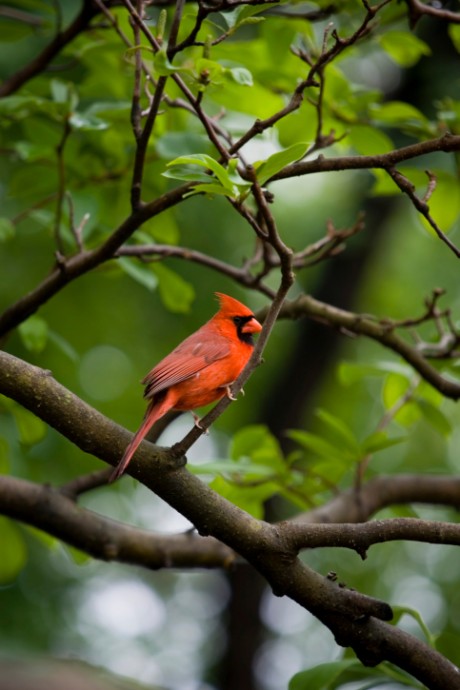For the Birds
The simplest thing you can do to help protect birds is to keep your cats indoors
Do you love to see the red flash of a cardinal wing or hear the cheery warble of a finch? The best thing you can do for your local bird population — even better than a bird feeder, house, or bath — may be the simplest thing possible. Birds are impacted by human disease, loss of habitat, pesticides, fisheries operations and collisions with man-made objects like towers, windows and wind turbines. Each year in the United States, cats (both domestic and feral) needlessly kill hundreds of millions of birds, plus more than a billion small mammals such as squirrels, chipmunks and rabbits. Domestic cats retain their hunting instincts although they may be well fed at home; their prey is sought solely for sport. According to one online blogging bird enthusiast, the average may be as high as approximately 35 birds killed per cat per year. So the simplest thing you can do to help protect our feathered friends? Keep your cats indoors. It's not only good for the birds, but beneficial for you and your cats as well.
Indoor cats have less opportunity to develop an illness or get hurt, so they stay healthier and require fewer visits to the vet. Diseases such as rabies, distemper and feline leukemia are contracted via secretions from or direct contact with an infected source — cats who venture outdoors are at a much greater risk of being infected. Some veterinarians believe that the reduced exposure to these illnesses indicates that indoor cats do not need vaccinations for all of them. (Check with your local veterinarian about required vaccines in your area.) Also you may save vet expenses and reduce your cat's likelihood of a reaction to a vaccine. Keeping your feline indoors results in a healthier cat that is easier and cheaper to care for.
You also are likely to stay healthier if your cat remains in the house. Cats who venture outdoors can easily transport unwanted creatures like worms, fleas and ticks in their fur. Fleas and ticks can cause costly and irritating infestations that can make you ill and affect your entire household.
In addition, indoor cats live much longer than their outdoor counterparts. The average life expectancy of an indoor cat is often more than 15 years, while outdoor cats are only expected to live for two to five years. The out-of-doors is a dangerous place for felines: animal attacks, diseases, deadly encounters with vehicles, and even poisoning are all possibilities.
So how can you transition your furry feline from an outdoor cat to an exclusively indoor one? A few suggestions:
- Provide a perch — in a sunny spot, if possible — where cats can watch the out-of-doors. (My cats can view a hanging outdoor bird feeder which I call "kitty TV.")
- Brush and play with your cats regularly.
- Household objects like string, boxes and bags provide endless free entertainment.
- Keeping the litter box clean makes it more appealing to use.
- A screened porch or enclosed deck allows for a safe outdoor experience for cats.
- Give your cat regular, "well-kitty" vet care.
- Spay or neuter your pet early in life.
Birds are beneficial to us in many ways, from pollinating crops and controlling insect pests to providing an enjoyable sport for millions of Americans. Together we can shield declining bird species by providing an indoor environment for our cats — a safe, simple, and free method to protect ourselves, our pets, and our pocketbooks.
-
Share this story:



